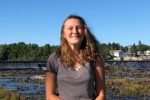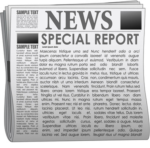
Two scholarships established in memory of Erin Peterson and Joan Trial.

The Erin Peterson Memorial Award was established in memory of Dr. Erin Peterson, a graduate of the University of Maine and a fisheries biologist with the State of Washington. Erin lost her life at the age of 31 doing what she loved.
The award is a collaboration with the Penobscot County Conservation Association (PCCA) and Erin’s family and friends. Beginning in 2024, the award will be made annually to an individual who is pursuing an advanced degree focused on conservation and management.

The Joan Trial Graduate Travel Award was established at the University of Maine Foundation with gifts from family, colleagues, and friends.
Of particular interest to Joan were the students she taught and mentored. Establishment of this award will continue to support student’s professional development in her memory.
To learn more about these two new awards or to make a donation to either of them, please visit – https://umaine.edu/wle/alums/give-back-department/
 Wildlife In the News
Wildlife In the News
See what faculty, students, staff,
and alums are up to
In Memory of Richard Nutter Smith ‘ 58
May 20, 2025 – Legacy.com
Richard Nutter Smith of Vienna, Virginia, passed peacefully at home on May 16,
2025. He was the beloved husband of Dorothy Shoemaker Smith for 65 years, and
loving father of Gretchen Burke (Paul), Cynthia Loftin (James), Jennifer Smith
(Parris), and Hilary Lambrecht (Bruce). Survivors include ten grandchildren,
Timothy (Maggie), Kelly, Jack, Steven, Daniel, Haley (Timothy), Anna, Stephanie,
Samuel, Isaac and great-granddaughter Penny. Also surviving is sister Marcia Mink
(Roy) of Franktown, VA and many nieces, nephews and cousins.
Plan to loosen federal habitat protection seen as threat to iconic Maine wildlife (Charney)
May 15, 2025 – by Penelope Overton, Portland Press Herald
Maine has its own state endangered species law, but environmentalists say a proposed change in federal law could hurt some Maine species the state has worked to protect.
Amphibians on the march for their Big Night (Charney)
May 4, 2025 – Kennebec Journal
On warm, rainy spring nights, Maine’s amphibians are on the move to make their moves, sometimes with human help.
In Memory of Paul O’Neil ’74
April 23, 2025 – Legacy.com
Leyden, MA – Paul M. O’Neil died on April 23 at home in Leyden during a short illness. Paul was born in Fall River on February 21, 1949, the son of Paul Francis O’Neil and Dorothy Muriel (Davis) O’Neil.
Two new murals in Bangor aim to draw attention to local ecosystem and culture (Fedarick)
April 25, 2025 – NewscenterMaine.com
Elizabeth Brennan: Outstanding Graduating Student
April 29, 2025 – UMaine News
Elizabeth Brennan of West Chester, Pennsylvania, is the Outstanding Graduating Student in the College of Earth, Life, and Health Sciences. She is a wildlife ecology major and member of the Honors College, through which she wrote a thesis titled “Phenological changes in Arctic and Common Terns across Maine’s coastal islands.”
Vernal Pools Are the Place to Be for Woodland Critters—as Long as They Last (Calhoun)
Spring 2025 – by Alice Sun, Audubon News
Researchers and community scientists have teamed up to map and protect these ephemeral biodiversity hotspots before they disappear for good.
Manchester family donates almost 100 acres to Kennebec Land Trust (Record)
March 10, 2025 – by Ethan Horton, Kennebec Journal
Matt Sinclair and his grandfather, Robert Hopkins, are hoping their gift of land in Manchester will give future generations an opportunity to be in nature.
Farmland- An Unexpected, Yet Important Habitat for an Elusive Migratory Bird (Darling)
February 11, 2025 – Nova Scotia Environmental Farm Plan
In an effort to address the decline in American Woodcocks (Figure 1), the Eastern Woodcock Migration Research Cooperative (woodcockmigration.org), an international collaborative project led by the University of Maine, partnered with dairy farm owners James (Sandy) and Emma Cole from Elderbank, Halifax County NS to study their migratory ecology.
In memory of Douglas Vollmer ’53
January 16, 2025 – Legacy.com
Douglas Albert Vollmer was born in New Rochelle, NY, on September 16, 1930, to Walter E.B. and Amy E. Olive (Griffin) Vollmer. He peacefully passed away from kidney failure on January 16, 2025, under the compassionate care of the Maine Veterans’ Home.
